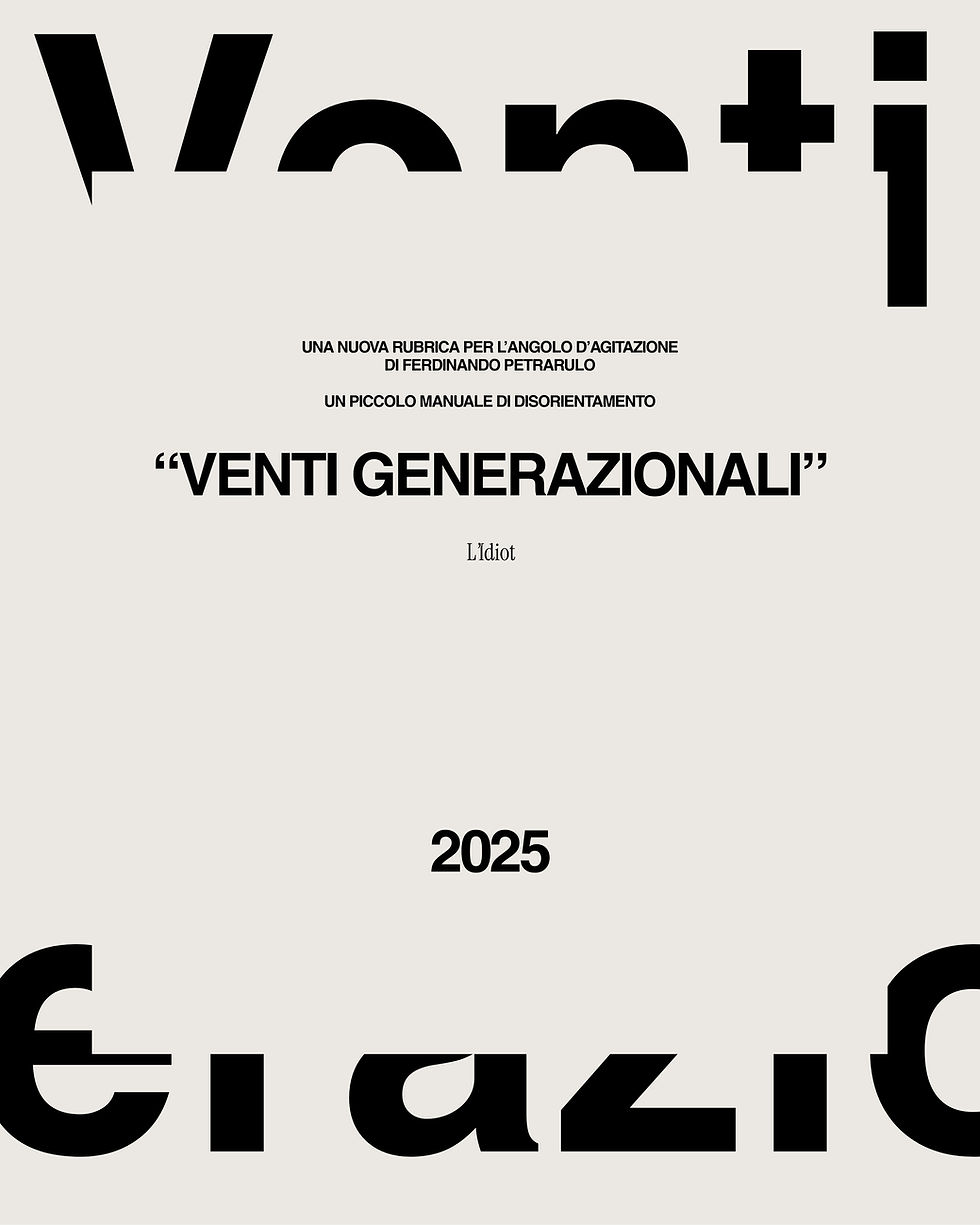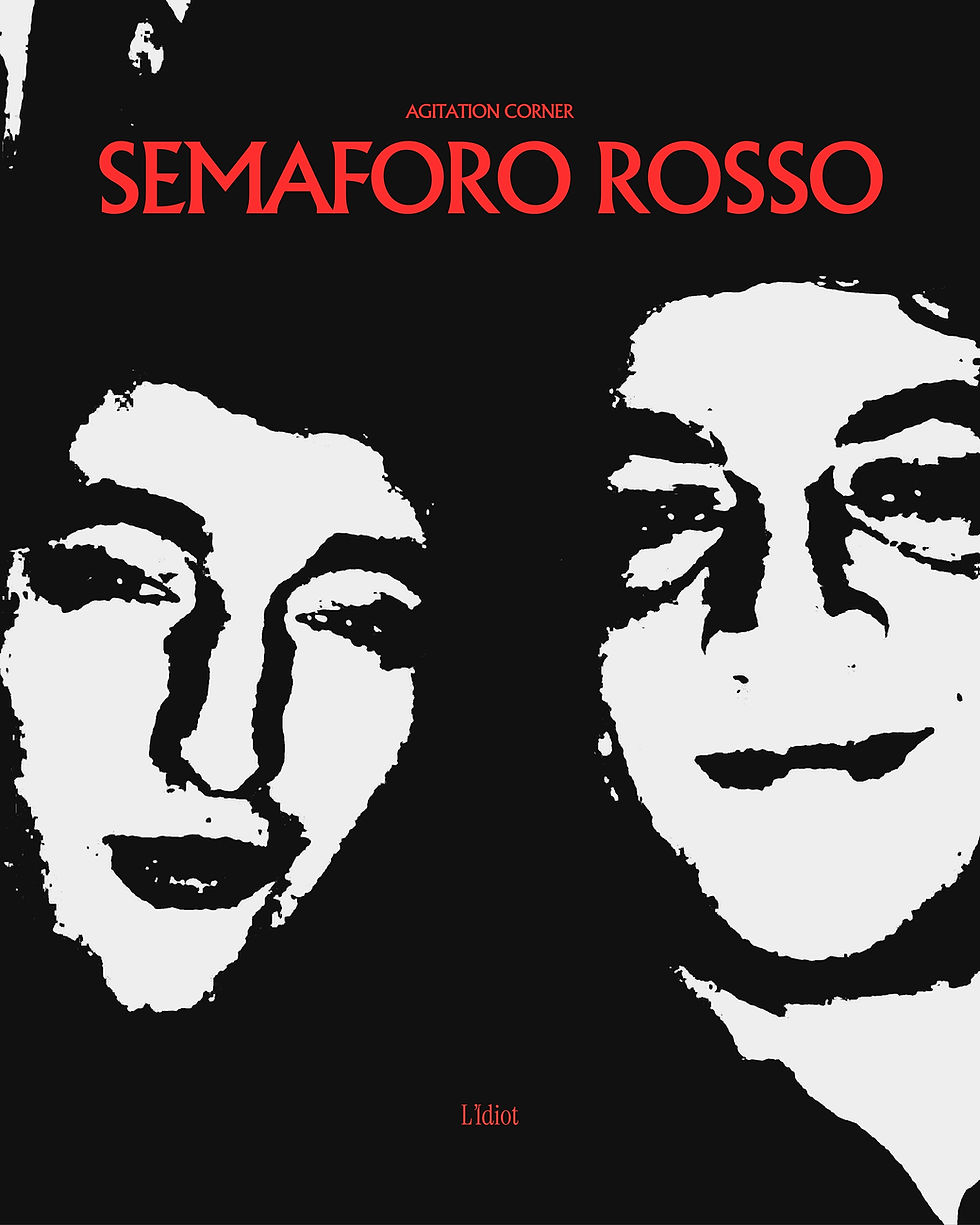I wanted to be someone when I grew up
- Ferdinando Petrarulo
- Jul 29, 2025
- 4 min read
Updated: Aug 23, 2025

There’s a childhood memory that isn’t all that unique. One of those flashbacks that belong to the collective memory—because the human being doesn’t exactly shine when it comes to originality, especially in the business of raising another human. Our reasoning digs its fragile roots right into that muddy ground. Ever since, at some point during my childhood—then adolescence, then my so-called awakening age—someone decided to slap me with the question of all questions:
“What do you want to be when you grow up?”
Only later, years later, and with a bit more self-awareness, did I realize that my answer had evolved over time. Depending, on the psychological impact that memory would have on me whenever I looked back. As a freshly self-proclaimed anthropologist, I’ll divide this evolution into four moments—or phases, if we want to pretend there’s a hint of technical method to it. The reader will soon notice: this isn’t a straight line heading toward infinity. It’s a circle.
And the reason why is not hard to grasp.
The first phase is the one of childhood (calling it the “little child” phase would be a form of poetic theft, if not outright desecration), but the core idea isn’t all that far off. I realized early on—and, to their dismay, so did the people around me—that practicality would never be my “extra gear” in life.
In fact, truth be told, someone had already picked up on the sad reality: I was going to be an idealist.
“Unfocused,” they’d add a few years later.
My answer, however, was always clear and sharp: When I grow up, I want to be a poet. Not because I had any concrete idea of what a poet actually does (to this day, I still don’t—luckily or not), but because rhyme had given something back to me. It was surrealism, it was escape. I was beginning to sense that the physical dimension of a human being is never the only possible one. I started to imagine others, and poetry seemed like a pretty usable tool to navigate that pre-adolescent trip of mine.
The second phase is the earthquake—the messiest of all.
By this point, I had realized there was hardly anything that didn’t already bore me. Poetry was already old news. So, I became a musician—because music, after all, had always been the constant thread. And I felt like it, so why not? These are the two most genuine phases. The phases of disillusionment, if you will.
It’s in the third phase that we start to untangle the real knot—the generational one.
Because it’s precisely in this post-adolescent stage that social pressure creeps in. In a society-slash-army that trains its cadets for frantic competition, the first actual wall you hit is university choice.
Following the narrative arc of these reflections, the writer will speak of himself.
Perhaps the reader might recognize themselves in these lines.
Mea culpa, I did it: I chose a course of study that “opens doors.”
The reason lies in the context.
The moment hit like a fast, thundering train—the moment you’re forced to become acquainted with, and then embrace, a destructive concept:
“When I grow up, I want to be somebody.”
And for some reason, in this age where capital is the compass, somebody is always tied to economic, financial, and entrepreneurial factors.
At some point in my life, I found myself surrounded by little androids chasing the dream: self-realization.
Not as individuals, but as cogs in a toxic mechanism.
All lined up, waiting for life to pay them back in money and Instagram-worthy well-being.
Let’s be honest—that’s what it is.
I was in it up to my neck.
To anyone asking what I wanted to be when I grew up, I’d reply with strange little startupper monologues that would make Harvard-era Zuckerberg step aside.
The truth?
I no longer knew what I wanted to do. I only knew I wanted to be someone, just like everyone around me.
Who made that decision for me?
The social context.
The logic of competition and the foot pinned to the gas pedal, rushing toward God-knows-what strategic goal.
All smoke, nothing else—but it made me feel helpful to “the cause.”
What that cause was, I still can’t quite say—but that’s how it was.
Run, run without stopping to catch your breath.
Make sure everyone sees that this little bastard is working hard for the future.
A place of prestige, obviously—because we’re all aiming for one, and heaven forbid anyone dares suggest an alternative.
Sometimes I wonder how the soul of the world intends to assign everyone a leading role.
We’ll all be protagonists in this play—no one cares about the extras.
They’ll just vanish, magically.
Everyone’s doing something important. And if it’s not essential, it becomes so thanks to overexposure.
If I don’t like what I’m doing, I’ll like the results it gives me.
And I’ll enjoy showing off those results.
It’s not hard to make a prediction: the sandcastle will collapse.
Because this historical moment is orphaned of certainties, of reference points, of a value system rooted in conscience.
Anxiety is our stepmother, and repeating to others—and to ourselves—that we want to become somebody, even if we don’t, hasn’t helped us get rid of her.
It’s had the opposite effect: it’s strengthened her evil embrace and turned it into a stranglehold.
Now anxiety rules us. It’s tamed us, whether we liked it or not.
The fourth and (hopefully) final phase is the therapeutic one.
One of acceptance.
The writer has already tried to slip a foot through this door.
I still don’t know who I want to be when I grow up—but I do know what I want to do:
I want to stop competing.
I’ve understood that I don’t want to be part of the grand mechanism.
Now I know: I want to be content.
With simplicity. With anything that heals.
For myself and for the souls around me.
For too long, I chased a dream that wasn’t mine, a chimera shaped by the twisted logic that governs the times I live in.
When I grow up, I want to be myself—not the version the system planned out for me.
To live by ideals, like a silent rebel.
There isn’t room for everyone in the tremendous merry-go-round of “becoming someone.”
I’ll gladly give up my spot to the next lucky winner.
Because of my extraordinary achievement, take my word for it,
will be to be normal.

I wanted to be someone when I grew up







Comments